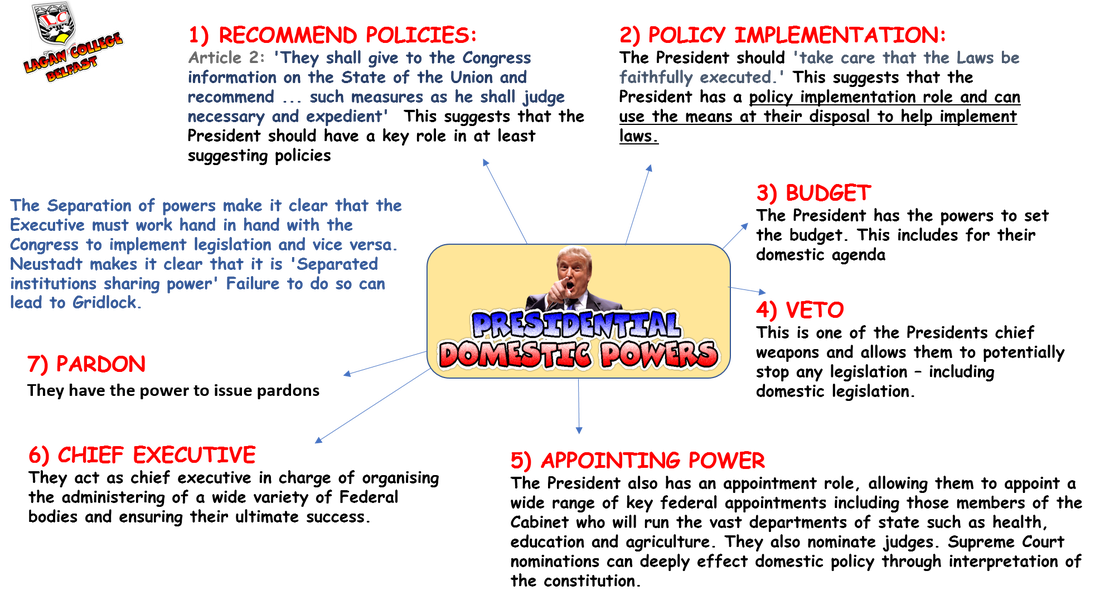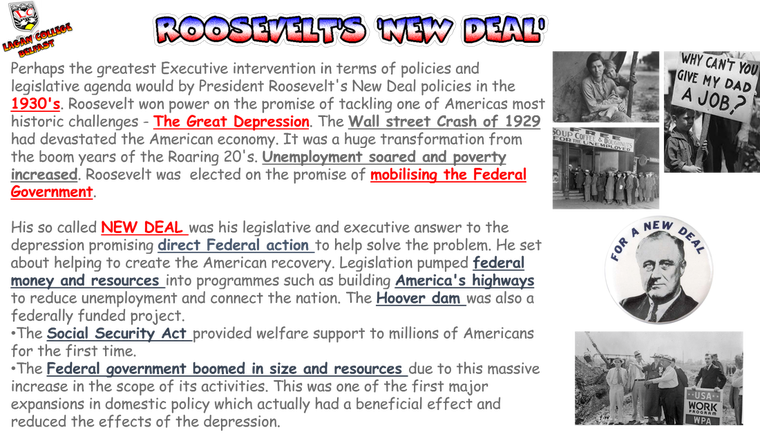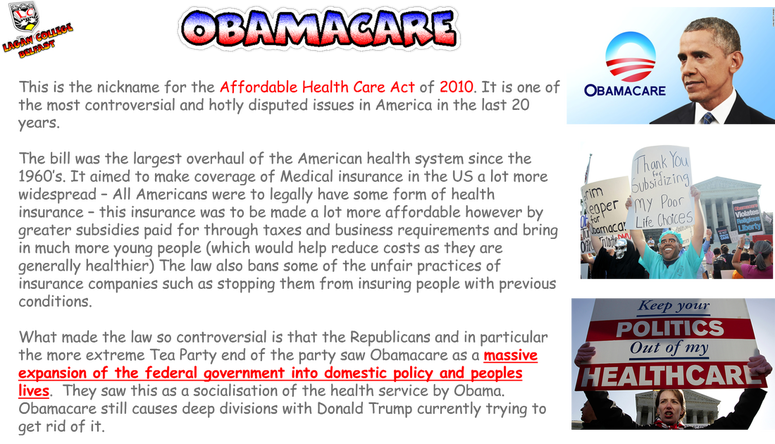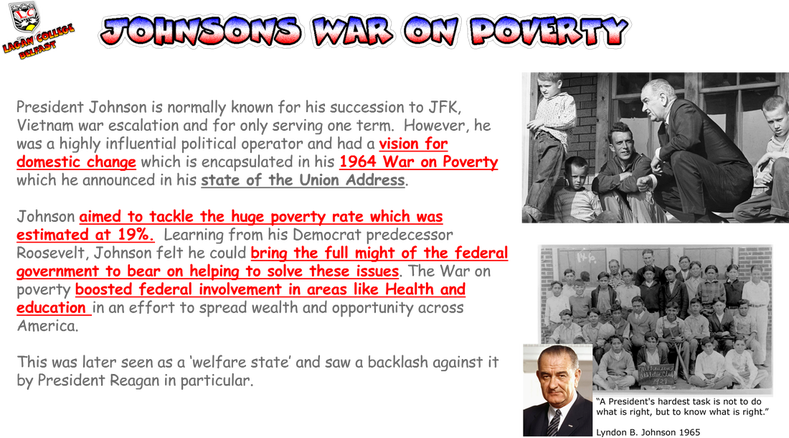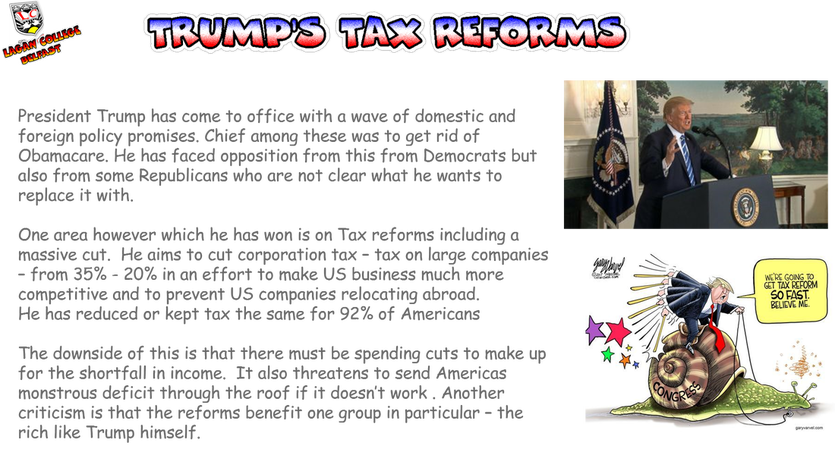American Presidents are traditionally viewed as being potentially powerful in Foreign affairs, where Congress is considered to allow a free hand, while a lot weaker in domestic affairs which Congress, it is assumed, will dominate. This idea of 'Two Presidencies' was outlined in 1969 by Aaron Wildavsky who suggested that there was a 'Foreign policy' and a 'Domestic policy President' - each with very different powers and limitations.
However, the modern 21st century President has to be seen to be actively involved in domestic politics too. While their powers may be curtailed in domestic affairs, failure to address it adequately has been proven to have consequences. President George H Bush for example was the President who was in charge when the Cold war ended - leaving the US victorious as the only remaining superpower. He was also the President who went into an election campaign on the back of a victorious military campaign in the 1990 Gulf War in which western forces defeated Saddam Hussein's Iraqi invasion of Kuwait. However, he lost that subsequent election to Bill Clinton on domestic issues - namely taxes. The last few years have saw domestic policy at the forefront of American politics with issues of healthcare, race, gun control and tax reform being highly prominent and the American President playing a key role in addressing these.
It can certainly be suggested that the Constitution of the United States gives the US President a domestic policy role but that this role was deliberately limited by the Founding Fathers.
1) SETTING THE LEGISLATIVE AGENDA - Recommending and implementing domestic policies
The constitution clearly allows for a President to 'recommend such measures as they judge necessary and expedient' This vagueness allows the President to expand upon this and forge a legislative agenda domestically. Candidates outline this in their election pledges. They also frequently use their set piece State of the Union Address to promote their message.
- Trump campaigned on an anti Washington message - His 'drain the swamp' message suggested that US Politics in Washington was dominated by lobby groups who were pulling the levers of government. He aimed to get rid of Obamacare; He wanted to build a wall at the border with Mexico and prevent visits from specified Muslim countries; He wanted to cut taxes massively (meaning cutting spending too) in a bid to boost the economy.
- Obama promised effective Medicare - which became known as Obamacare ; He gave aid to the banks to keep them solvent and prevent another Great Depression; He campaigned (unsuccessfully) for gun control, especially following the Sandy Hook shootings. He regards this as the greatest failure of his presidency.
- Bush campaigned on the promise of lower taxes and a stronger military.
- Clinton campaigned very heavily on a domestic policy agenda. He had little foreign policy experience as Governor of Arkansas. Yet it was his concentration on these domestic policies which helped win him the election against George Bush who was campaigning heavily on this foreign policy agenda.
DOMESTIC POLICY EXAMPLES
Remember that a President cannot individually raise a law in congress. However, they can get a member of Congress to introduce legislation on their behalf. A President will also have to work very closely with Congress to get their legislation pushed through building alliances and using their presidential persuasion.
2) THE PRESIDENT SETS THE BUDGET
|
Although the House of Representatives controls the Purse Strings, it is the President who has the role of organising the budget and prioritising spending. They have their own Office for Management and Budget to fall back on - This is part of the EXOP and helps prioritise spending in relation to the Presidential priorities. The President can also help implement how much money is collected in taxes and how much spending goes up or down.
|
|
3) VETO
|
This is one of the Presidents most powerful tools granted to him in the US Constitution. They can VETO [block] any legislation from Congress they do not agree with. The President has to veto within 10 days of receiving the bill and must explain why they have refused to sign it. They have to reject the whole bill not just part of it. They can also use their Pocket veto if Congress is adjourned within this 10 day period.
However, a President tends to use this power rarely but wisely. Congress has the power to override the Veto with 2/3rds majority in both Houses and this could embarrass a President. The threat of the Veto is usually enough to create compromise. |
|
4) APPOINTING POWERS
|
As part of their role as Chief Executive, the President has the power to appoint a vast array of federal figures including the Cabinet (which has key domestic policy positions such as Secretary of Health and Education.) the head of Federal agencies and Supreme Court Judges - which could influence the interpretation of the constitution and therefore play a big role in domestic policy implementation. See the video >
However, it must be remembered that the Senate has to confirm any federal appointments. This is by a simple majority but can sometimes cause problems. Trump's Education Secretary nominee Betsy DeVos for example was heavily grilled over her credentials to be Education secretary. |
|
5) POWER TO PARDON
|
The President also has the power to Pardon Federal crimes. This is contained in the Constitution which states that the President "shall have power to grant reprieves and pardons for offenses against the United States, except in cases of impeachment.'
The most famous case of giving a Pardon was President Ford offering the pardon to disgraced US President Nixon over Watergate. |
|
|
|
|


